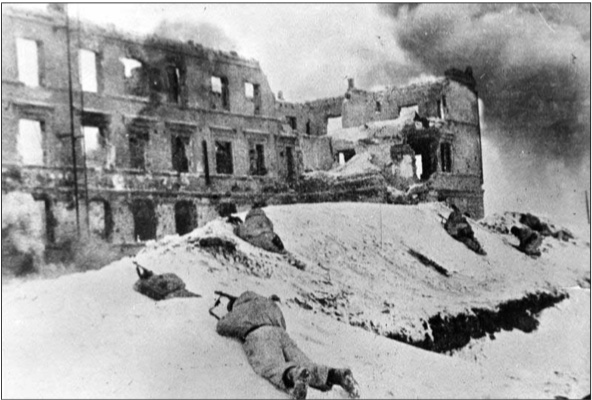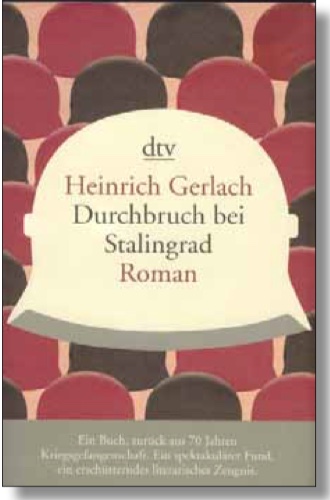Hunger, cold and death
Göring had promised Hitler to supply the entrapped army by air – with 600 tons of food and war material every day. However, he miscalcualted the situation. From the beginning on, the rickety Ju-52s managed less than half of the promised supplies. Often heavily loaded they were shot down by the Russians or crashed after a failed landing. At the beginning of January 1943 the Russians had conquered the airfields, and then supplies were cut off completely. After that, the dramatic situation increased.
The situation of the soldiers in January 1943 became worse and worse cold, hunger, epidemics, wounds, death, despair paralyzed the soldiers. Because of the frozen ground the dead could no longer be buried. Often they were piled up like logs next to the military posts, or were left lying under the snow. Supplies quickly ran out. In mid-January 1943, General Paulus reported to Hitler that there were 16,000 wounded not provided for – most of them lying in improvised hospitals and that the supply situation was catastrophic. (p. 385) He asked for freedom to act or permission to stop the fight. Two hours later Hitler replied: “Freedom to act refused – surrender not allowed”, “fight to the last bullet”, “fight to the last man”. Further wireless messages in these weeks were: “You can rely on me, I will get you out”, “Generous supply will be rolling in”.
Such promises were intended for the simple soldier, who believed in Hitler to the end. High officers knew that the troops, which were normally available as reserve forces, were nowhere near. Hitler had sent them to the Caucasus to conquer the oil fields of the Caspian Sea. They were also in trouble and on the retreat – in any case they were far too far away to be of any help.
The end came at the beginning of February. When the snow finally melted in spring, the Russians buried the bodies of 142,567 German soldiers. The number of dead Russian soldiers and civilians, however, was much higher. About 90,000 German soldiers were taken prisoners.. However, they were so run-down, wounded, discouraged, sick, half or almost completely starved to death that the death rate in the following weeks and months was about 90 percent.
Staying human in an extreme situation
With the title “Breakthrough at Stalingrad” Gerlach didn’t mean a military concept, but the breakthrough in the minds of the soldiers gradually realizing that they were involved in a criminal war, and even more – that “war” is a crime against humanity. The novel becomes a harrowing literary testimony and an anti-war novel. In his choice of title literary expert Gerlach referred to a much quoted passage by Ulrich von Hutten (1488-1523): “I do not dream of the happiness of old times, I break through and do not look back”. That’s what he did, too.
At the beginning of February 1943, many officers, including high ranking officers, committed suicide by shooting themselves. Death seemed easier for them than slow decay or “certain death in captivity” – as Goebbels claimed in his propaganda. For Gerlach, staying alive was a breakthrough – the first act in his fight against Hitler and for Germany.
The novel is extremely dense but easy to read. It covers wide areas of the human psyche, military affairs, history, politics and philosophy. Gerlach describes the war with all its horrors. However, he does not focus on military procedures – but on the soldier as a human person who somehow tries to cope with the extreme situation and with himself. As a grammar school teacher Gerlach was used to talking to his students. Thus he masterfully succeeded in involving the reader in countless conversations – between soldiers, sargeants, officers, between Lieutenant Breuer (Heinrich Gerlach’s alter ego) and his driver, between captains and colonels, between German soldiers and captured Russians and also with inhabitants of Stalingrad trying to survive in the basements – and asking themselves “why“?
Generals in bondage to Hitler
As first lieutenant, Gerlach had no access to the actual command of the army. But he was lucky to be sent to a prisoner-of-war camp for officers who under the Geneva Convention were not required to work. There, immediately after the battle he found time to start writing down his experiences and so to unburden himself of the horrors – first as a diary, then as a novel. There he met some of the 22 captured generals from Stalingrad, one of whom had repeatedly been flown out of the encirclement during the battle to report to Hitler and then returned with his instructions. They realted the conversations at the head of the 6th Army, at the Führer’s headquarters, and sometimes from Hitler’s lunch table, to which they were invited. Gerlach incorporated their narratives into his novel – so that the reader can see the desperate situation from the perspective of the very top. Gerlach emphasizes in his epilogue that nothing is invented, everything is based on “personal experiences and conversations with German soldiers and officers who fought at Stalingrad”.
A literary masterpiece
The novel has been written by a master of language. Two passages may serve as an example: Gerlach describes the decisive attack led by the Russians against a weak spot in the German front:
There! Suddenly the air fills with a sinister and eerie hissing and whizzing sound. Cries of fear and shouts of alarm ring out. And then, in an instant, the storm is upon them. All of a suden a forest of flames erupts from the rumbling ground, and a hailstorm of shrapnel comes whistling towards them, as clouds of sulphurous smoke billow across the plain. […] Fountains of earth burst upwards, forming a wall that then comes crashing down on the minefield in front of their position, setting off the charges, shredding the barbed-wire entanglements, burying trenches and machine-gun nests, and whipping up a maelstrom of pieces of wood, weapons and human body parts, before rolling on to the rearward artillery positions. All to the accompaniment of a terrible seething, roaring, howling and cracking sound… The very ground on which they are standing, torn and lacerated, flinches under the hellish onslaught of material. What a piece of work is man…!
The directors of the film studio, subsequently making these or similar scenes into a film, would need tons of pyrotechnic material without even remotely achieving the effect Gerlach expresses in these few lines.
And this is how Gerlach describes his return to Berlin from his captivity as a prisoner of war on 22 April 1950:
Slowly he climbed the steps up to the ticket barrier. […] His legs grew heavier and heavier. There was the barrier now, beneath the large station clock. And behind it, huddled in a corner by the ticket booths as if in fear, stood a woman […] [He] went up to her. A boy was standing beside her, as tall as her. A child’s drawing showing a tree and house and two yellow suns above. Two suns illuminating a bunker in Stalingrad…” (p.662)
Carsten Gansel – sensitive discoverer of the original version
That Gerlach’s six-hundred-page novel is immediately followed by an afterword of nearly two-hundred pages is rather unusual. The reader senses that “Durchbruch bei Stalingrad” has become for its discoverer, Carsten Gansel, professor of literature, a matter of the heart. He carefully examines the historical and political circumstances under which Gerlach had written his novel. Particular attention is being paid to the activities of the “League of German Officers” and the “National Committee for a Free Germany”, and to Gerlach’s editorial work for its newspaper “Free Germany”. Moreover, he compares the original version with the second version, which Gerlach wrote ten years later. In addition, Gansel carefully analyses the two expert reports on the book that were commissioned by the Soviet leadership and places them in their proper context.
Comparing the second version with the original version, Gansel notes that in the later version the author’s perspective has slightly changed. Here Gerlach puts the criminal methods of warfare adopted by Hitler into the foreground – which is also reflected in the new title “The Forsaken Army”. By contrast, the original version focuses more strongly on the soldier’s wide-ranging inner world of thoughts and emotions and on the existential questions that arose in Stalingrad.
75 years after Stalingrad: lest we forget!
February 2018 marked the 75th anniversary of the Battle of Stalingrad. In today’s Volgograd, where a huge memorial commemorates the event, large commemoration ceremonials were taking place. From the German Federal Government nobody took part in them. Differences with Putin or not – it is incomprehensible that the Chancellor (who now wants to build a European army) did not bother to pay her respect to the 142,567 German soldiers buried there and to their relatives. The far greater number of Russian soldiers and their families and the inhabitants of Volgograd would have deserved this respect even more so – nobody, after all, invited Germany to invade Russia and the city on the Volga river, and the dead on both sides did not die voluntarily. Officials of the German Armed Forces were not at Volgograd, either. As Michael Henjes from the Federal Ministry of Defence put it: “Stalingrad is a myth that is not so much present anymore. In the Federal Armed Forces this is no longer an issue today. Threads have been cut.” (“Hannoversche Allgemeine Zeitung” from 1 February 2018) – In the end, only a small group was present – some people of the city partnership of Cologne and Chemnitz with Volgograd, some MP’s of the leftist party and a few of the SPD.
A “Durchbruch” („breakthrough“) to new insights and to a new way of thinking is as important today as after the Second World War. This would at the same time defuse the migration problem – far more than the a UN global migration pact. The publication of Gerlach’s harrowing account comes at precisely the right time. •
Sources:
Gerlach, Heinrich, Durchbruch bei Stalingrad, Munich: DTV, 2017.
Gerlach, Heinrich. Breakout at Stalingrad. Translated by Peter Lewis. London: Apollo, an Imprint of Head of Zeus, 2018.
Diedrich, Torsten. Ebert, Jens. Walther von Seydlitz. Nach Stalingrad – Feldpostbriefe und Kriegsgefangenenpost 1939–1955. Göttingen: Wallstein Verlag, 2018


